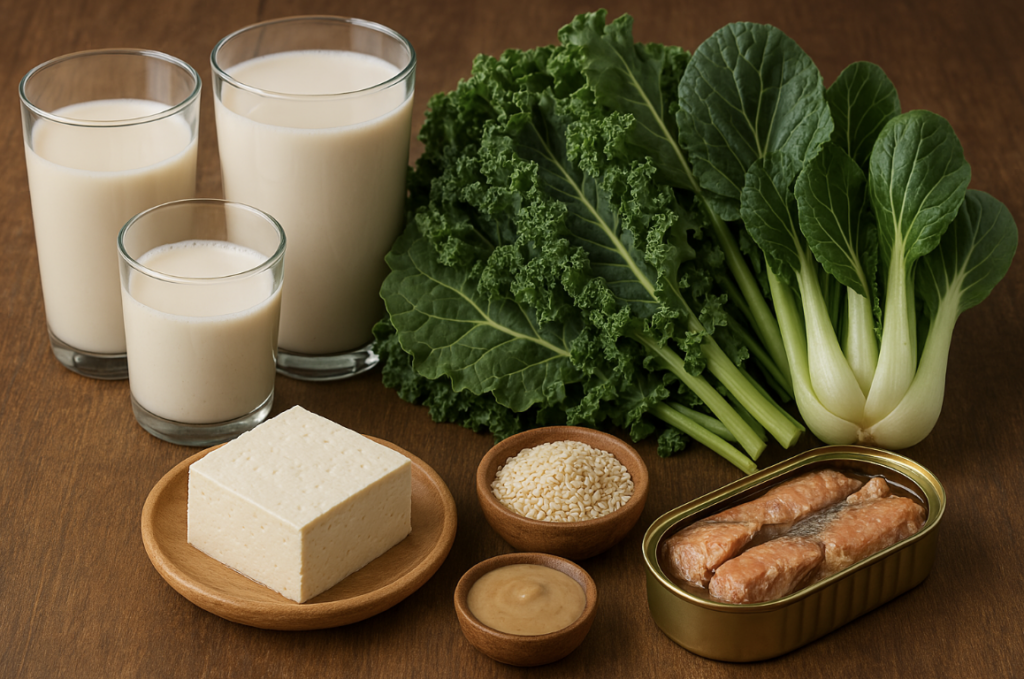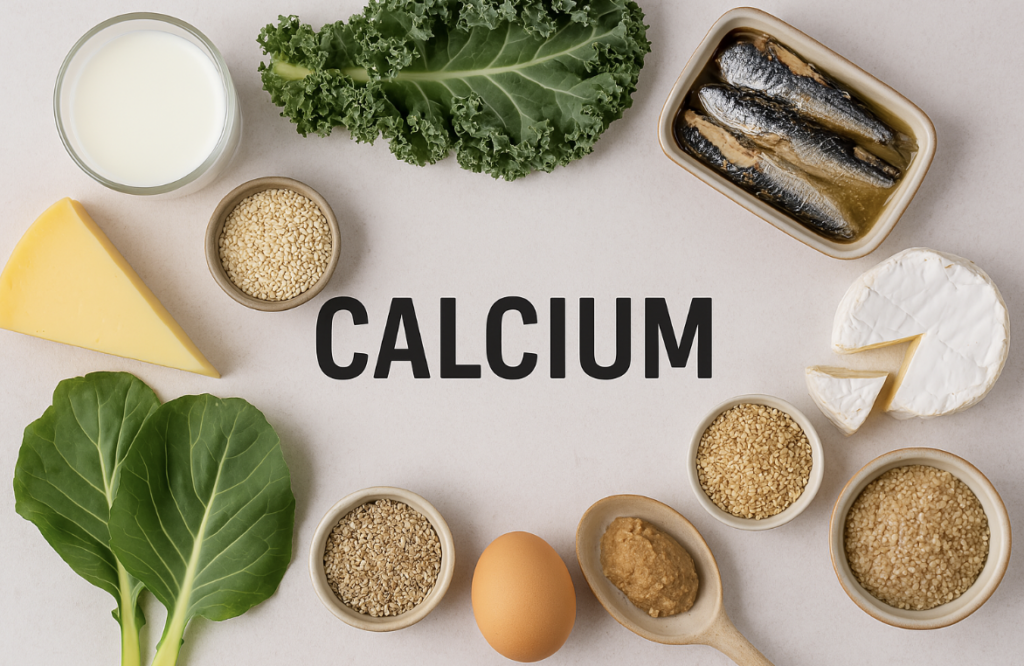Calcium is the most abundant mineral in the human body—and it’s best known for building strong bones and teeth. But calcium also plays a vital role in muscle function, nerve signaling, heart rhythm, and hormone secretion. While it’s commonly associated with dairy, there are many ways to get calcium from both animal and plant-based sources. In this guide, you’ll learn why calcium is important, how to prevent deficiency, and the best ways to absorb and balance it for lifelong bone health.
What Does Calcium Do in the Body?
Calcium is stored mainly in bones and teeth, but it’s also found in the bloodstream where it supports vital cellular functions.

✔ Key Roles of Calcium:
- Builds and maintains strong bones and teeth
- Helps muscles contract and relax
- Supports blood clotting
- Regulates nerve transmission and communication
- Plays a role in enzyme function and hormone release
💡 Did You Know? About 99% of your calcium is stored in bones and teeth, while the remaining 1% circulates in your blood.
Health Benefits of Calcium
✔ 1. Strengthens Bones and Reduces Fracture Risk
Calcium, especially when paired with vitamin D, is essential for bone density and the prevention of osteoporosis.
✔ 2. Supports Heart and Muscle Function
Calcium helps maintain a steady heartbeat and enables muscle contractions (including the heart muscle).
✔ 3. Prevents Bone Loss with Aging
Women over 50 and older adults are especially at risk of losing bone mass, making calcium even more crucial.
✔ 4. Aids in Weight Management (Indirectly)
Some studies suggest that calcium-rich diets may help regulate fat metabolism and reduce body fat storage.
✔ 5. May Help Reduce PMS Symptoms
Calcium supplementation has been shown to ease mood swings, fatigue, and bloating associated with premenstrual syndrome.
Signs of Calcium Deficiency

⚠️ Common Symptoms:
- Brittle nails and thinning hair
- Muscle cramps or spasms (especially in legs)
- Numbness or tingling in fingers
- Fatigue and irritability
- Osteopenia or low bone density on scans
💡 At-Risk Groups:
- Postmenopausal women
- People with lactose intolerance or dairy allergies
- Vegans and vegetarians
- Individuals with vitamin D deficiency
- Those on corticosteroids or certain medications
Best Dietary Sources of Calcium

🥛 Dairy-Based:
- Milk, cheese, and yogurt (especially plain or low-sugar versions)
🌿 Non-Dairy Options:
- Fortified plant milks (almond, soy, oat)
- Leafy greens (collard greens, kale, bok choy)
- Tofu made with calcium sulfate
- Sesame seeds and tahini
- Canned salmon or sardines (with bones)
💡 Tip: Oxalates in spinach and Swiss chard can hinder calcium absorption—opt for lower-oxalate greens like bok choy instead.
Daily Recommended Intake (RDI)
- Adults (19–50): 1,000 mg/day
- Women 51+ and men 71+: 1,200 mg/day
- Teens (9–18): 1,300 mg/day
How to Improve Calcium Absorption
✔ Pair calcium with vitamin D (enhances absorption)
✔ Avoid excessive sodium and caffeine (increase calcium loss in urine)
✔ Spread calcium intake throughout the day
✔ Engage in weight-bearing exercise (stimulates bone retention)
💡 Note: Your body absorbs calcium better in smaller doses—500 mg or less at a time.
Calcium Supplement Considerations
💊 Common Types:
- Calcium carbonate: Most common; take with food for better absorption
- Calcium citrate: Easier to absorb, especially for older adults or those with low stomach acid
⚠️ Warnings:
- Excess calcium from supplements (>2,000 mg/day) may lead to kidney stones or interfere with other minerals
- Calcium can reduce absorption of iron, magnesium, and certain medications
Pros and Cons of Calcium
✔ Pros:
- Crucial for lifelong bone strength
- Supports muscles, heart, and nerves
- Easy to get from both food and fortified options
⚠️ Cons:
- Can interfere with absorption of other nutrients
- Over-supplementation risks (e.g., kidney stones)
- Some plant foods contain compounds that reduce bioavailability
Calcium is more than just a bone-building mineral—it’s essential for your muscles, nerves, and long-term vitality. With the right combination of foods, smart supplementation (if needed), and attention to vitamin D levels, you can support strong bones and a healthy body for life.
Read more on vitamin B12 for energy and brain health
Learn more about calcium from the National Institutes of Health
